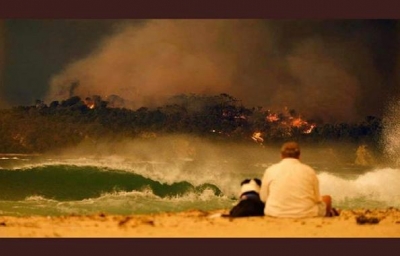Sydney, Jan 11 (IANS) Australia on Saturday witnessed of a drop in temperatures in the southeastern part of the country, providing much-needed relief to control the raging bushfires, following a day of intense heat and strong winds that caused several blazes to merge.
On Friday night, three fires joined to form a megafire in the Snowy Mountains that straddle the border between the states of Victoria and New South Wales (NSW), Efe news reported.
This second gigantic fire – after that of Gospers Mountain, which has been raging in the west of Sydney and burnt an area equivalent to seven times the area of Singapore – has led to concerns among authorities, along with the possibility of other fires fusing, despite recent rainfall that was, however, insufficient to control the blazes.
“Hopefully, we will not see more thunderstorms and more dry thunderstorms and lightning strikes causing new fires,” NSW Rural Fire Service Commissioner Shane Fitzsimmons told the media on Saturday.
Police and Emergency Services Minister Lisa Neville said that while it has rained in some areas affected by fires, such as East Gippsland, the danger now was the possibility of thunderstorms causing flooding and consequently endangering firefighters and emergency service workers.
Australia has experienced episodes of catastrophic fires since September 2019, the most serious being on New Year’s Eve.
Cooler weather has been forecast for the next seven days as some 2,800 firefighters will look to establish containment lines.
“It would appear that we have got at least a week, it will probably be the best seven days we have had without a rise of very dangerous fire ratings,” said the NSW fire chief.
Since September, the fires have ravaged more than 80,000 square kilometres, an area larger than Ireland, and left 27 people dead, besides an estimated one billion wild animals.
The fires have released some 349 million tonnes of carbon dioxide into the atmosphere over the past four months, according to the non-profit Periodistas por el Planeta (Journalists for the Planet), compared to the 532 million tonnes of total annual emissions by the country in all of 2018.
–IANS
ksk/

